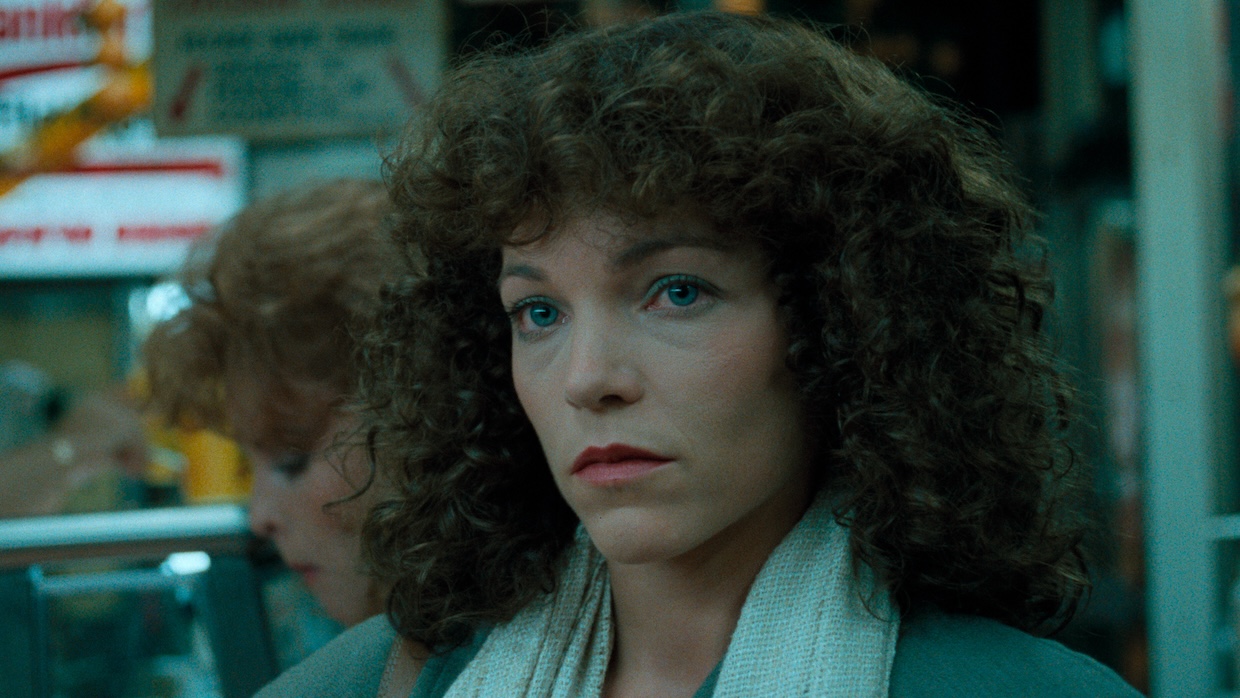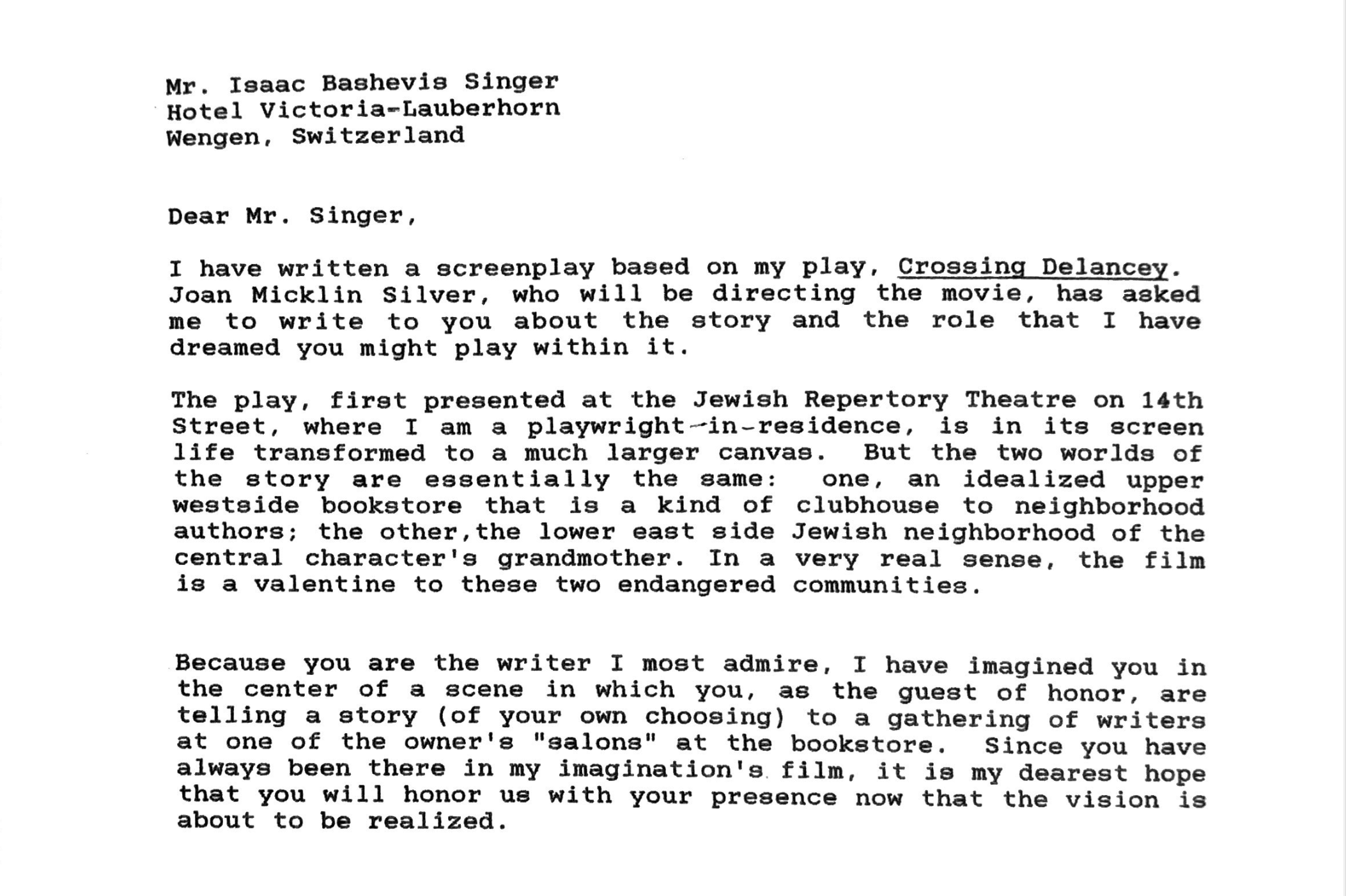 Back to selection
Back to selection
“I Found My Pickle Man”: Amy Irving on Crossing Delancey
 Amy Irving in Crossing Delancey
Amy Irving in Crossing Delancey [This is the second of three interviews with key collaborators on Joan Micklin Silver’s Crossing Delancey. Click here to read the first part, an interview with screenwriter Susan Sandler, and check back tomorrow to read the final part, an interview with co-star Peter Riegert.]
Filmmaker: Joan Micklin Silver is a filmmaker whose reputation has really grown over the past decade, and I’m curious what her secret sauce was, for lack of a better term. What do you remember about working with her?
Irving: Joan spent a lot of time figuring out her cast. If you look at all her movies, it’s a good group of actors. She was a New Yorker who went to the theater and paid attention to what an actor can bring, and once she chose you for that particular role pretty much let you go with it. She liked who we were, our choices. If you see a director whose vision is so clear and doesn’t doubt herself at all, that’s a really important thing for an actor. To know how hard she looked for each of us gave you that confidence to play your character, and be so relaxed you can take it to places you hadn’t thought of until you’re doing it. For an actor, that’s just a wonderful way to work. She would listen to other people, which I loved. Susan Sandler was there by her side all the time, and any suggestions that came from her, or from Theo Van de Sande, our DP, or any of us, she always listened to. But she knew exactly the film she was going to make, and she made it.
Filmmaker: In both this and Hester Street, what I find so compelling is the push-pull between heritage and aspirations, tradition and modernity, and the question of what’s lost and what’s gained when you contemplate the possibility of reinventing yourself.
Irving: That’s the whole world I was having to play: Downtown, on the other side of Delancey, and the love Izzy felt for her bubbe. At the same time, in her uptown world, which is the modern world that she was attracted to, she’d be resisting the ideas that her bubbe had for her, the matchmaker and the [idea that] our world is defined by a man. She managed a bookstore—she wasn’t a celebrity, a writer, an artist, but I think that rubbing shoulders with those people elevates your world. So, obviously she becomes attracted to someone from that world. You don’t necessarily see right away that he wasn’t an authentic person, because you’re up in the clouds and you’re like, “Oh, I get to be a part of this world.” Then it turns out that he’s an asshole, but, you know, you can find that in all worlds. But, literary soirees or a man with his arm up to his elbows in pickle juice—there wasn’t the same appeal. Izzy wasn’t looking at the people, she was looking at what they do—people aren’t necessarily what they do, you know? It’s the kind of dilemma we all live, which is why people still watch this today and get so much out of it. It’s fun talking to people in their 30s now, who go “I’ve seen this film 100 times.” I haven’t seen it 100 times, but it’s really wonderful that it’s getting this second life.
Filmmaker: We rewatched the movie in preparation for this interview with a friend of ours, who has, in fact, seen it probably 100 times. She came over, and we all ate pickles and smoked fish, and we all were, as we are every time we watch it, appalled by Izzy’s treatment of the pickle man.
Irving: People yell at the screen. I’ve seen it! You know, I feel that way too. I get very mad at myself.
Filmmaker: Well, we’ve all had our heads turned by somebody who represents a more aspirational side of our personality. That moment where the pickle man has his arms up to his elbows in the pickle brine—this is not just a dichotomy between uptown and downtown, but also, perhaps, between, the life of the body and the life of the mind. You mentioned that Izzy’s not a writer, which is something I also asked Susan Sandler about. What does Izzy want to do with her life? What are her gifts?
Irving: If you look at those soirees she contributed to the bookstore, and [which] she was very proud of, she was good at curating. I personally don’t think that she had aspirations to be a writer—you never once see her pick up a pencil. I think if you want to write, you’re probably doing that. Most artists have some attraction to the pen, the paintbrush or the microphone earlier on than when we meet Izzy. I don’t think she is an artist; I think she’s a curator, and she was proud of that work.
Rosemary Harris played the famous poet—Isaac Bashevis Singer got stage fright at the last minute, decided not to do it, and I had to call Rosemary Harris in North Carolina where she lived: “Can you come up tomorrow? Trust me, the script is good. You can stay with me, we’ll have a great time.” And she was like, “Okay, darling.” She was wonderful. But the fact that Izzy could get Isaac Bashevis Singer to come to her little Upper West Side bookstore, you know she’s good at what she does.

Susan Sandler’s letter to Isaac Bashevis Singer. Courtesy/copyright of Susan Sandler.
Filmmaker: You’re a musician as well. You have an album coming out.
Irving: Thank you for mentioning it.
Filmmaker: Well, it leads to a question, which is —
Irving: About the Roches?
Filmmaker: Yes! I’m curious if you knew their music at the time, and what you think it brings to the film. [Four songs by the Roches, a folk-trio comprised of three sisters, are the backbone of the Crossing Delancey soundtrack; Suzzy Roche also appears in the film.]
Irving: I did know the Roches before. Just as Joan cast really well, the music was the sensibility of what was inside this woman’s world, and it kept it from dragging it down into a very serious place. It has this wonderful fun lilt to it and harmony.
Filmmaker: To continue in Izzy’s world, how well did you know Izzy’s Upper West Side?
Irving: I lived on the Upper West Side since I was 11 years old. My daddy took over the Lincoln Center Repertory Theater in ’65, so we lived literally in Lincoln Towers across the street from Lincoln Center. The Upper West Side was my playground. As a matter of fact, that’s how I met Joan. She tells this story all the time, but she found me in a movie theater—she was an East Sider, so I don’t know what she was doing over there, but she saw me there looking like a real, normal person. She liked to say I was “scarfing popcorn,” and I probably was.
Filmmaker: Do you remember where the interiors and exteriors were for Izzy’s apartment?
Irving: I believe our apartment was in the 70s. I could walk [to it]. It was all real apartments.
Filmmaker: I once passed up the opportunity to have my old apartment used for an indie movie and I regret that very much, because I don’t live there anymore and would like to be able to still see it.
Irving: Movie companies trash your home. I would never let a movie company into my home.
Filmmaker: I’ve read that a lot of Izzy’s wardrobe is out of your closet.
Irving: I’m a very instinctive actor. I don’t do a whole lot of intellectualizing about the character—“Oh, well, she’s reading this magazine.” As you read the script, you drop the seeds of the character; you think about where you work and where you play. When I go to my closet or a department store, I gravitate towards it, and when I put it on, it may not be something I would wear, but if it fits… Her shoulder pads were maybe a little subtle [for the era], because I didn’t like the really big ones. But that was very dressed up for me. I never get out of blue jeans.
Filmmaker: I should also ask about your relationship with the hair and makeup department, whether you remember being styled in any specific way.
Irving: Besides the ones that say “I found my pickle man,” for a lot of women who come up to me, after Crossing Delancey it felt okay to not straighten their hair anymore. It was almost like if you have curly hair, you look too Jewish. That was pretty much how my hair was, but they wanted it a little darker, so there’s a little color in there. But other than that, it was just how I was wearing my hair. Sometimes I look at it and go, “Yeah, that was the time.” It was a lot of hair.
Filmmaker: We were all trying to figure out what size Izzy’s fedora would had to have been.
Irving: Big. I mean, I have to wear men’s hats, I have a large head anyway, but yeah, the fedora had to be.
Filmmaker: I should ask one more question, while we still have time. Because she’s a really interesting actor to me, I’m curious if you have any memories of working with Sylvia Miles.
Irving: [Laughs] Sometimes it was really hard to keep a straight face with her, because she was so out there. It really worked, but she was not a subtle actor. I’d known her personally as well. In real life and on screen, a huge character. Watching her eat was the hardest thing to do with a straight face. I mean, the woman would park her food on her teeth and start talking. You think it was daring, but for Sylvia, that wasn’t daring, because that was just Sylvia. Sylvia was daring coming out of the womb.
